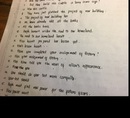Exercise 2
1. No one would have attended (A) the lecture if you told (B) the truth about (C) the guest speaker (D).
2. Because (A) his sickness (B), he didn’t take (C) part in the English competition (D).
3. A galaxy, where (A) may include billions of (B) stars, is (C) held together (D) by gravitation attraction.
4. The tongue is the principal (A) organ of taste (B), and is (C) crucial for chewing, swallowed (D), and speaking.
5. Each of the members (A) of the group were (B) made to write (C)...
Đọc tiếp
Exercise 2
1. No one would have attended (A) the lecture if you told (B) the truth about (C) the guest speaker (D).
2. Because (A) his sickness (B), he didn’t take (C) part in the English competition (D).
3. A galaxy, where (A) may include billions of (B) stars, is (C) held together (D) by gravitation attraction.
4. The tongue is the principal (A) organ of taste (B), and is (C) crucial for chewing, swallowed (D), and speaking.
5. Each of the members (A) of the group were (B) made to write (C) a report every week (D).
6. Why don’t (A) you congratulate our son about (B) passing (C) his final (D) exam?
7. Neither of the girls (A) have (B) turned in the term papers to the (C) instructor yet (D).
8. The secretary told (A) me that an important file had left (B) in the lunch room just (C) the other (D) day.
9. The (A) little boy’s mother bought him (B) a five-speeds (C) racing bicycle for (D) his birthday.
10. Since (A) fireworks are dangerous (B), many countries have laws to prevent (C) businesses to sell (D) them.











 Giups mik vs ah
Giups mik vs ah

